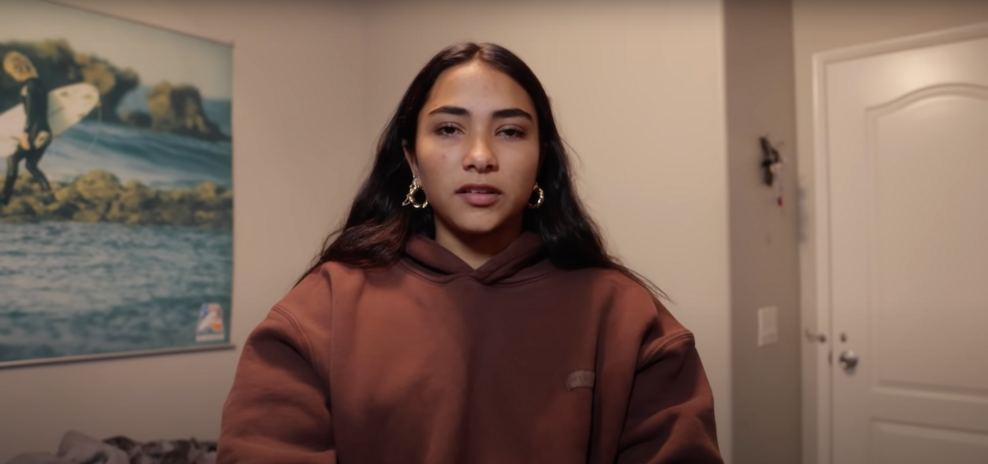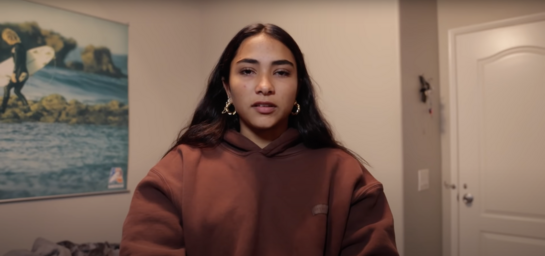Content warning: This post includes discussion of sexual assault.
On May 30, TikToker Sienna Mae Gomez was accused of sexually assaulting Jack Wright, a fellow TikToker, by Wright’s friend Mason Rizzo. Gomez, 17, “unequivocally denied” these accusations in two videos that she uploaded to her YouTube and TikTok accounts in the following days. Ultimately, through the back and forth nature of the allegations against Gomez — which included an Instagram statement from Wright, Gomez’s videos, and a video of the alleged assault being uploaded to TikTok by a third party witness — the allegations became an online spectacle, with TikTok users weighing in on their validity. The private, and potentially legal dispute, between Gomez and Wright, 18, was instead playing out over the internet and onlookers began to insert themselves into the conversation. (Her Campus reached out to Wright for comment and didn’t hear back at time of publication. Gomez’s team declined to comment.)
Amid the pandemic, Wright and Gomez partially gained popularity within their young fan base for their are-they-aren’t-they relationship. Because their relationship had always been a topic of discussion on the internet, fans conflated the accusations with petty relationship drama. Debating the validity of sexual assault claims between two high schoolers and uploading videos online “picking sides” is insensitive and potentially triggering at best, and illegal at worst. This is just the most recent in a string high-profile cases of sexual assault involving a minor that’s played out on TikTok over the past year, rather than being solely handled offline by legal counsel. In 2020, social media influencers Zoe Laverne, James Charles, and Tony Lopez were all accused of grooming minors, the details of which were then discussed openly on shade accounts like TikTokRoom and Hannah Kosh. While social media can provide an outlet to discuss the emotional impact and raise awareness about sexual violence, these conversations can quickly devolve and become counterproductive.
According to Laura Palumbo, the communications director for the National Sexual Violence Resource Center (NSVRC), debating sexual assault allegations on apps like TikTok can have grave consequences. “One of the greatest challenges is that too often, [when] sexual assault is talked about on social media, it is not being taken seriously,” she tells Her Campus.
Because Gomez’s and Wright’s relationship had always been a topic of discussion on the internet, fans conflated the accusations with petty relationship drama.
Over the following week, TikTok was flooded with videos talking about what happened between Gomez and Wright, as users lost sight of how serious the sexual assault allegations are. Fans recounted everything they knew about the situation, reinterpreted past interactions between Gomez and Wright, and used lighthearted sounds including the “International Super Spy” and “Into the Thick of It” trends (two songs from the kid’s show The Backyardigans) to declare what sides they were on. Sound bites from Gomez’s videos even became their own trends. The audio clip of her saying, “Right now all I want to do is go up to my room and cry and die” has been used over 10,000 times and a clip of her saying, “If you have a problem with me, please feel free to call me, and if you don’t have my number, then we don’t have a problem” has been used almost 2,000 times. Most of these videos are completely decontextualized, with Gomez’s words now playing over videos of users complaining about something as unrelated as gymnastics practice.
Although social media apps like Twitter played an enormous role in 2017’s #MeToo movement, Palumbo says that debating the legitimacy of sexual assault allegations online can also perpetuate harm against surviviors. “When a specific case is in the public eye, the account is dissected in an open forum, rather than taken seriously when a survivor comes forward,” Palumbo says. “Dismissive arguments about who should be believed or who should be taken seriously is harmful and contributes to the victim-blaming that keeps so many survivors silent.”
The reaction to the allegations made against Gomez follow a familiar pattern, one that can be triggering for many survivors of sexual assault. “We should approach convsersations around sexual violence in a manner that is conscious of and respectful of the trauma that has been experienced, and also centered on the survivor,” Erinn Robinson, press secretary for Rape, Abuse, & Incest National Network (RAINN), tells Her Campus. But the internet reaction in this case fails to center the alleged survivor, who chose not to publicly come forward with the allegations in the first place. Additionally, the case involves high schooler kids, whose private lives continue to be dissected online for sport.
Debating the legitimacy of sexual assault allegations online can also perpetuate harm against survivors.
“Male survivors sometimes face extra scrutiny when disclosing experiencing sexual assault,” Robinson says. As such, many male survivors do not come forward and seek out the support needed to heal. “It’s important to understand that sexual violence can happen to anyone, regardless of gender identity, sexual preference, race, ethnicity, religious background, etc. Any conversation about sexual violence must be inclusive.”
While Gen Z is known for its ability to joke about trauma, this is a case in which the collective humor should be put on pause. According to the NSVRC, jokes about sexual assault harm survivors. Sexist punch-lines, rape jokes, and victim-blaming comments correlate directly to real-life violence because they minimize the experiences of survivors and reinforce rape culture. By casually inserting ourselves into Wright’s and other survivors’ experiences, we are picking up destructive practices that can have potentially severe consequences. Going forward, we can take a step back and give survivors space to speak up, if they so choose. In learning how to be better allies, we can offer our support, instead of further perpetuating harm.
If you or someone you know has been sexually assaulted, call the National Sexual Assault Telephone Hotline at 800-656-HOPE (4673) or visit online.rainn.org.
Experts:
Laura Palumbo, National Sexual Violence Resource Center, Communications Director
Erinn Robinson, Rape, Abuse, & Incest National Network, Press Secretary


